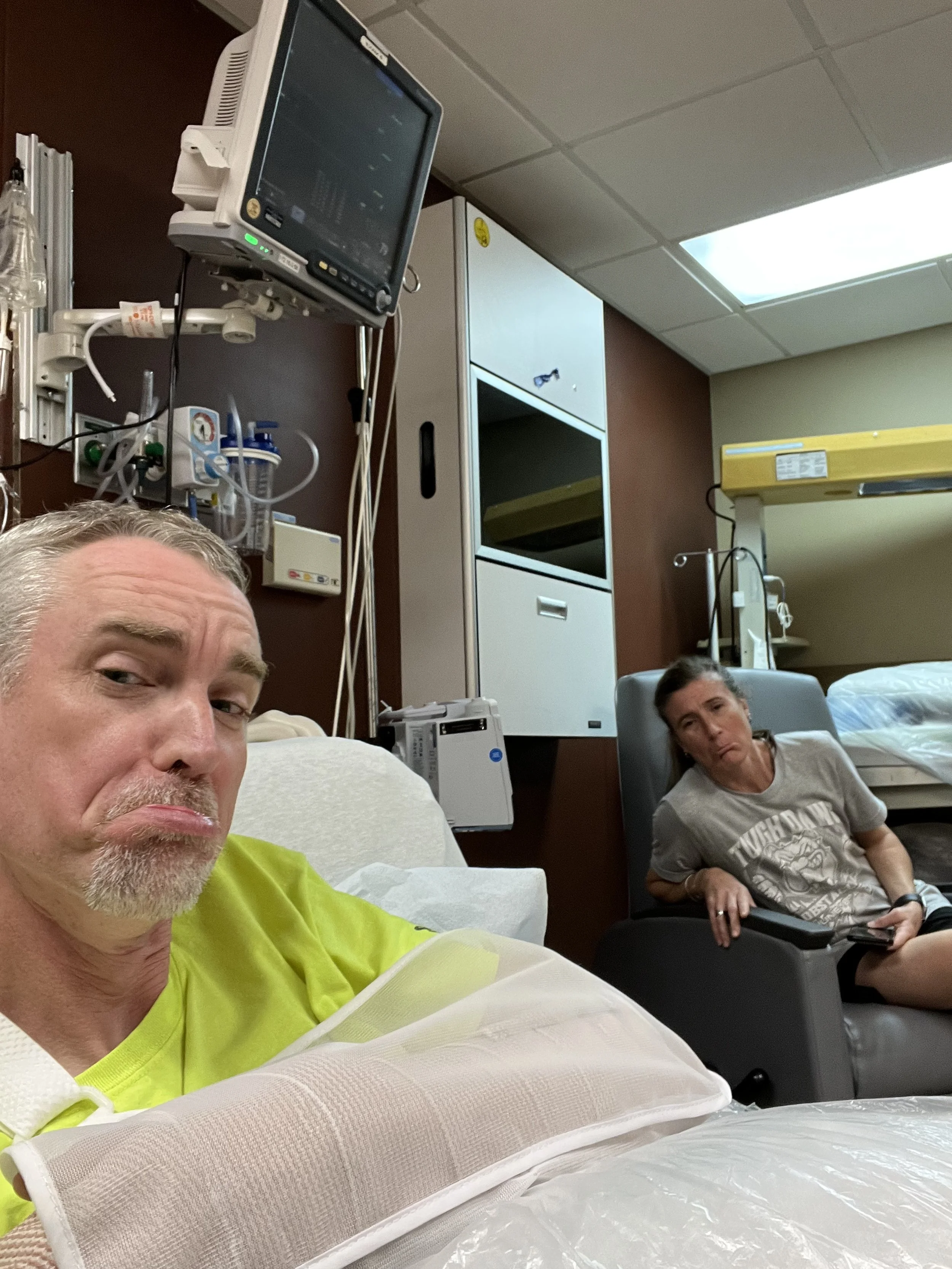Regretting the sermon I did not preach
One of my greatest regrets is the sermon I did not preach. In the summer of 2005, my grandmother died at the age of 85. I loved her dearly and grieved her loss greatly. The days following her death unfolded with the familiarity that custom and culture dictate. The family began to gather, and plans were made for a visitation and funeral service. The day after her death, extended family and friends came to the funeral home to visit with the family. The funeral was the following day in the church where she had been a member for most of her life.
It is unlikely that you knew my grandmother. You may not have known me then or even now. Yet because grief is a common experience among all humanity, you can identify intimately with my experience. Grief is common among all because death is known by all. Since Adam and Eve walked out of the garden, every generation has known the weight of death and the suffering of grief. Like a weight on your chest, it labors your breathing. Like an unwelcomed disability, it robs food of its flavor. And though the world around you continues, grief drains the enjoyment from activities that once were enjoyed. Location, language, and culture separate us from others around the world. History and time separate us from those who lived before us. But every people and every generation that has ever walked the earth has known grief. We may have no other connection, but all of humanity throughout history finds familiar and common ground in the experience of grief.
Two days after my grandmother’s death, I entered the church for her funeral service with a heavy heart. Grief seemed to color everything I saw, and its burden seemed to labor every breath and make cumbersome every step. I did not choose to preach at my grandmother’s funeral, thinking it would be better for me to just be a part of the family and let others perform the service. My grandmother’s pastor had served the church where she was a member for decades. She loved him, and he loved her. He knew her well, and I was sure that his many years of being her pastor would allow him to preach her funeral well. I have regretted that decision ever since.
The pastor, who had had a long tenure at the church and had served with my grandparents for many decades, was able to draw from a deep well when he shared personal antidotes and reflections about my grandmother. Some of the stories he shared caused us to laugh, and others caused us to cry. All of his personal reflections were authentic in his love for my grandmother and reflected the fruit of having spent so many years doing ministry together with her in a small church and community. As he spoke, I was thankful for the fruit of both my grandparent’s faithful church service and of the pastor’s long tenure at the church.
But when the pastor turned his attention away from eulogistic reflections and attempted to speak words of comfort, he lost his footing. I genuinely believe that he wanted to provide some consolation to those of us grieving. I have no doubt that his desire was to speak to us words to soothe our grief and assuage our sadness. In that moment of significant loss, he tried to speak of profound things that would last and had the power to alleviate our grief. But instead of comforting us with the eternal word of God, he spoke that day of things that sounded profound but were less than transcendent. He said, “your grandmother will have eternal life in your memories.” He offered as comfort the words, “your grandmother will live on and remain with you in your hearts.” He spoke these things with genuine concern and conviction. At first, they seemed to have weight and truth, but they proved to be less than helpful on reflection. Memories are sweet, but there are many things about my grandmother I never knew, and there are many things about her I have already forgotten. Keeping her “in my heart” seems, at first, to be a sweet sentiment but, on reflection, holds no lasting weight. Rather than encourage, these words cheapen the biblical truth and gospel hope. These words deny the power of the eternal God, who is able to keep His promises of bodily resurrection and eternal life, to those who have died in faith and instead places the hope of eternity in the frail and fleeting heart of man. His words were nice-sounding, but they were powerless.
During the service, my heart yearned to declare the true hope of salvation. There is no doubt that I loved my grandmother, but through the cross, Jesus loved her more. There is no doubt that I would have done anything within my power for my grandmother, but the truth is that Jesus has done more by paying the price for her redemption. The hope we have when a saint dies is not that we will remember them. The hope we have when a saint dies is not that we will remain and hold their memory sure. No. The hope we have is that Jesus is coming again, and those who have believed in Him for salvation will rise anew with a glorified imperishable body. The hope we have is that over 2000 years ago, there was a grave with the physical dead body of Jesus in it, but on Sunday morning, He rose again, and He is still alive today. My hope is that Jesus is the first fruit of the resurrection, and all those who believe in faith will rise and know the resurrection as well. That is the hope of the gospel. This hope is the only true comfort when we are confronted by death. Only the gospel gives hope in the brokenness of this world. The words we use to comfort one another in grief are powerless and pointless if they are not grounded in and testify to the word of God and the promise of the resurrection.
My hope is not in my memory. My hope is not in anything of myself. My hope is in the empty tomb of Jesus. My hope is in Jesus, who has defeated death and lives today. My hope is in Jesus, who has satisfied the law’s demand and removed the curse of sin and death. My hope is in the promise that because Jesus has risen from the dead, He will cause the dead in Christ to rise in glorified bodies at the last trumpet. My hope is in the promise that because Jesus has risen from the dead, He will cause those who remain at His second coming to be transformed and given glorified bodies.
This is what I believe. This is what I preach. This is what all those who have been saved believe and preach. He is risen! He is risen indeed!
Like death and grief, funeral services are a common part of the human experience. Every culture throughout human history has had rites and customs that dictated how the community grieved the loss of a loved one and marked the end of a person’s life. But more than just cultural customs, funerals are theological. Funerals testify to what we believe about life, death, and eternity. For Christians, funerals are one of the most important and significant moments where we preach the hope of the gospel. Christian funerals, like the rest of the world, include remembrances of the life of the deceased, but the more significant and important part of Christian funerals is proclaiming the life, death, and resurrection of Jesus. The hope of the resurrection alone allows us to grieve with hope.
Seventeen years have now passed since that warm July afternoon in 2005. As a pastor, I have preached at many funerals since that day. If God gives me many more years in the ministry, I will likely preach many more funerals. At every one of the funerals I have preached since my grandmother’s service, I am reminded of the lost opportunity to preach the hope of the resurrection that day. I remember the powerless words that were substituted for the powerful promise of the resurrection. I reflect on how hopeless it is to search for eternal meaning and truth among the temporary and corruptible things of this world. And I determine again never to miss another opportunity to proclaim to a world groaning under the weight of sin and death that there is hope in Jesus who has overcome sin and death.





















Last week, the Southern Baptist Convention held its Annual Meeting. Gathering in New Orleans, LA, there were nearly 19,000 in attendance. Of these, 12,737 were registered messengers (messengers are similar to delegates) from 4,423 churches. During the two days of meetings, the messengers worked through a packed schedule that included changes to the doctrinal statement of the Convention and a constitutional amendment, among many other things. Southern Baptists are unique in that we have our debates over critical issues in public with the opportunity of any registered messengers to speak. This does not always make for flattering soundbites in the news and sometimes leads outside observers to think that we are contentious and in constant conflict. For those who attend the meetings and participate in the decisions, even in greatly debated issues, we generally depart the annual meeting more encouraged in the work and cooperation of the SBC. Below are some of the more significant decisions of the messengers to this year’s annual meeting.